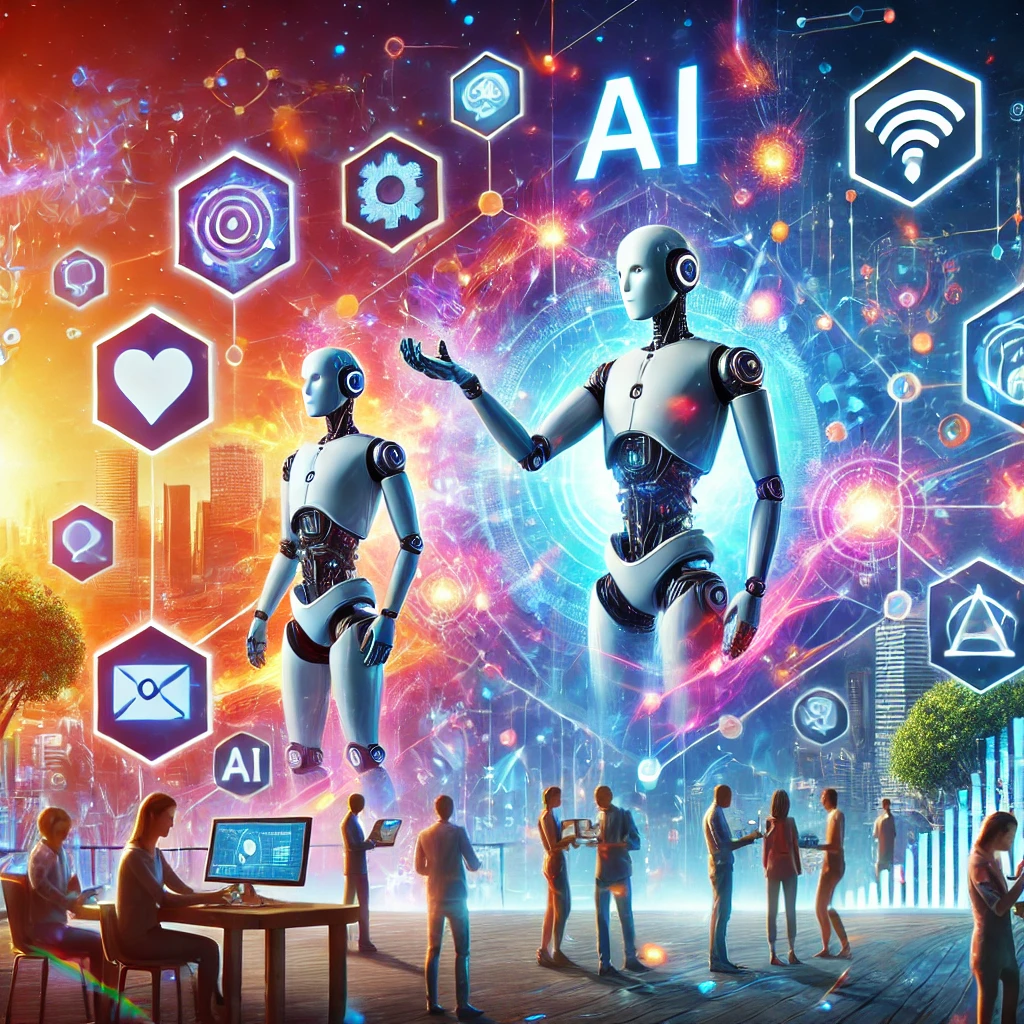How AI is Revolutionizing Digital Marketing and Customer Experience
Artificial Intelligence (AI) is no longer just a buzzword; it’s a powerful force that’s reshaping industries across the globe. In the realm of digital marketing, AI is bringing about a seismic shift, enabling businesses to engage customers more effectively, personalize experiences, and optimize marketing strategies. This blog delves into how AI is revolutionizing digital marketing and customer experience, driving unparalleled innovation and efficiency.
1. Personalization at Scale
In today’s digital world, customers expect personalized experiences tailored to their preferences. AI enables brands to deliver hyper-personalized content at scale. By analyzing data such as browsing history, purchase behavior, and even social media interactions, AI can help marketers create individualized experiences that resonate with each customer.
For instance, AI-powered recommendation engines, like those used by Amazon and Netflix, analyze user behavior to suggest products or content that a user is likely to be interested in. This level of personalization not only enhances customer satisfaction but also increases conversion rates, as customers are more likely to engage with content that feels relevant to them.
2. Predictive Analytics
AI’s predictive capabilities are a game-changer for digital marketing. Predictive analytics uses machine learning algorithms to analyze historical data and predict future outcomes. In digital marketing, this can be used to anticipate customer behavior, optimize campaigns, and forecast trends.
For example, AI can help marketers identify potential leads who are more likely to convert, allowing them to focus their efforts on high-value prospects. Additionally, predictive analytics can optimize ad targeting, ensuring that ads reach the right audience at the right time, maximizing return on investment (ROI).
3. Chatbots and Virtual Assistants
AI-driven chatbots and virtual assistants are transforming customer service by providing instant, 24/7 support. These intelligent systems can handle a wide range of customer queries, from answering FAQs to assisting with purchases, all while delivering a seamless experience.
Chatbots like those used by businesses on Facebook Messenger or WhatsApp can engage with customers in real-time, solving their problems and guiding them through their buyer journey. These AI-powered tools not only enhance customer experience by offering quick and accurate responses but also free up human agents to handle more complex tasks.
4. AI-Powered Content Creation
Content is king in digital marketing, but producing high-quality content consistently can be challenging. AI is stepping in to assist with content creation by generating data-driven articles, social media posts, and even personalized email campaigns. Tools like OpenAI’s GPT can generate coherent and engaging content based on the input it receives, making content creation more efficient.
While AI-generated content still requires human oversight to ensure quality and accuracy, it can significantly reduce the time and effort required to produce content at scale. This allows marketers to focus on more strategic tasks while ensuring that their content strategy remains robust and consistent.
5. Improved Customer Insights
AI excels at processing vast amounts of data quickly and efficiently, which allows businesses to gain deeper insights into their customers. AI-powered analytics tools can uncover hidden patterns and trends in customer behavior that may not be immediately apparent to human analysts.
With these insights, businesses can refine their marketing strategies, improve customer segmentation, and deliver more targeted campaigns. For instance, AI can analyze customer feedback, both structured (such as survey responses) and unstructured (like social media comments), to gauge customer sentiment and identify areas for improvement.
6. Enhanced Advertising
Programmatic advertising, powered by AI, is revolutionizing the way ads are bought and placed. Instead of manually selecting ad placements, AI algorithms automatically purchase ad space based on data insights, optimizing for the best performance. This real-time bidding process ensures that ads are shown to the right audience at the right time, leading to higher engagement and better ROI.
Moreover, AI can help optimize ad creatives by analyzing which elements (such as visuals, headlines, and calls-to-action) resonate most with specific audience segments. This allows marketers to continuously refine their ad campaigns for maximum effectiveness.
7. Voice Search and AI Assistants
The rise of voice search, driven by AI assistants like Amazon’s Alexa and Google Assistant, is changing the way consumers search for information online. With more people using voice commands to find products and services, marketers need to optimize their content for voice search to stay competitive.
AI plays a crucial role in understanding natural language and context, enabling businesses to create content that aligns with voice search queries. Optimizing for voice search involves focusing on conversational keywords and answering common customer questions, ensuring that your brand remains visible in voice search results.
8. AI for Email Marketing
Email marketing remains one of the most effective digital marketing channels, and AI is taking it to the next level. AI-powered email marketing tools can analyze customer behavior to determine the optimal time to send emails, the best subject lines to use, and even the type of content that will resonate most with each recipient.
By automating these processes, AI helps marketers create personalized, high-performing email campaigns that drive engagement and conversions. Whether it’s segmenting your audience based on behavior or crafting dynamic content that adapts to the recipient, AI is making email marketing more effective than ever.
9. AI and Social Media Marketing
Social media platforms are leveraging AI to help marketers reach their audience more effectively. AI algorithms on platforms like Facebook, Instagram, and LinkedIn analyze user behavior to deliver personalized content and ads to users. Additionally, AI-powered social listening tools allow marketers to monitor conversations and trends in real-time, enabling them to engage with their audience more effectively.
AI can also help with content creation on social media. Tools like Canva’s AI-powered design suggestions and Lumen5’s AI video creator help marketers generate visually appealing content that captures attention, driving higher engagement rates.
Conclusion
AI is undeniably transforming digital marketing and customer experience. From personalized content and predictive analytics to AI-powered chatbots and programmatic advertising, AI enables marketers to work smarter, not harder. As AI continues to evolve, its impact on digital marketing will only grow, creating new opportunities for businesses to connect with their customers in innovative and meaningful ways.
By embracing AI, businesses can stay ahead of the curve, deliver exceptional customer experiences, and drive sustainable growth in an increasingly competitive digital landscape. The future of digital marketing is here, and AI is leading the way.







Leave a Reply